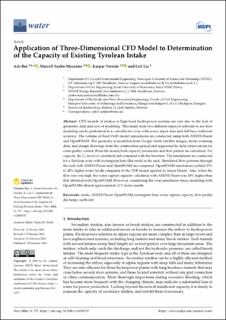| dc.contributor.author | Bor Turkben, Asli | |
| dc.contributor.author | Szabo-Meszaros, Marcell | |
| dc.contributor.author | Vereide, Kaspar Vatland | |
| dc.contributor.author | Lia, Leif | |
| dc.date.accessioned | 2024-04-04T13:12:15Z | |
| dc.date.available | 2024-04-04T13:12:15Z | |
| dc.date.created | 2024-03-06T16:08:48Z | |
| dc.date.issued | 2024 | |
| dc.identifier.issn | 2073-4441 | |
| dc.identifier.uri | https://hdl.handle.net/11250/3124908 | |
| dc.description.abstract | CFD models of intakes in high-head hydropower systems are rare due to the lack of geometric data and cost of modeling. This study tests two different types of software to see how modeling can be performed in a cost-effective way with scarce input data and still have sufficient accuracy. The volume of fluid (VoF) model simulations are conducted using both ANSYS Fluent and OpenFOAM. The geometry is modelled from Google Earth satellite images, drone scanning data, and design drawings from the construction period and supported by field observations for extra quality control. From the model, both capacity parameters and flow pattern are calculated. For capacity, the Cd factor is calculated and compared with the literature. The simulations are conducted for a Tyrolean weir with rectangular bars (flat steel) in the rack. Simulated flow patterns through the rack with ANSYS Fluent and OpenFOAM are compared. OpenFOAM simulations yielded 15% to 20% higher water levels compared to the VOF model applied in Ansys Fluent. Also, when the flow rate was high, the water capture capacity calculated with ANSYS Fluent was 10% higher than that obtained with OpenFOAM. However, considering the total simulation times, modeling with OpenFOAM offered approximately 11% faster results. | en_US |
| dc.language.iso | eng | en_US |
| dc.publisher | MDPI | en_US |
| dc.rights | Navngivelse 4.0 Internasjonal | * |
| dc.rights.uri | http://creativecommons.org/licenses/by/4.0/deed.no | * |
| dc.title | Application of Three-Dimensional CFD Model to Determination of the Capacity of Existing Tyrolean Intake | en_US |
| dc.title.alternative | Application of Three-Dimensional CFD Model to Determination of the Capacity of Existing Tyrolean Intake | en_US |
| dc.type | Peer reviewed | en_US |
| dc.type | Journal article | en_US |
| dc.description.version | publishedVersion | en_US |
| dc.rights.holder | The Authors | en_US |
| dc.source.volume | 16 | en_US |
| dc.source.journal | Water | en_US |
| dc.source.issue | 5 | en_US |
| dc.identifier.doi | 10.3390/w16050737 | |
| dc.identifier.cristin | 2252504 | |
| dc.relation.project | Norges forskningsråd: 257588 | en_US |
| dc.source.articlenumber | 737 | en_US |
| cristin.ispublished | true | |
| cristin.fulltext | original | |
| cristin.qualitycode | 1 | |

